(Publisher’s Note: This feature was released a couple of years ago, but we’re publishing it again this evening because of the interest in the history of the former amusement park along Interstate 70. Enjoy!)
He’s 76 years old now, and his favorite toy rests in his front yard near the eastbound lanes of Interstate 70 close to Cambridge. It’s a Rocko Plane from the former Paradise Lake Amusement Park that opened and closed in Guernsey County nearly four decades ago.
And Harley Bates, who lives on land once used for a truck stop before Interstate 70 wedged its way west toward Columbus, finds it funny.
“I’m not on the Internet at all, but my wife, Janice, is, and she tells me when there’s stuff on Facebook about it,” he said. “Some of the things on there get a lot of reactions, and it’s interesting to see some of the comments.”
In late 1970s, developer Phil Fry began purchasing hundreds of acres of parcels that butted up against Bates and his 1.2 acres. Fry had purchased rides from amusement parks in Ocean City, Md., Myrtle Beach, S.C., and Gettysburg, Pa., and he had constructed theme areas known as Fantasy Paradise, a Space Paradise, and a Western Paradise.

One attraction, the Rocko Plane ride, was purchased from Chippawa Lake Park, but, according to Jim Futrell of the National Amusement Park Historical Association, it was never erected at Paradise Lake.
That does not matter to Bates, though, and if someone calls it a rocket ship, this man will set them straight.
“One day not too long ago this guy pulled onto the property, and I asked him if I could help him, and he wanted to know about the silver thing in the yard. I told him that it was my Rocko Plane, and he told me that it was actually called a rocket ship, and I told him that it was a Rocko Plane,” Bates said. “He was a guy who had a museum up near Youngstown, and he kept calling it a rocket ship, and that’s when I explained to him that it was always called a Rocko Plane here, and he said he understood.
“He had one similar in his museum, and he wanted to buy one of them, and I told him that I didn’t want to sell mine because it stirs up too much interest, and we have fun with that,” he said. “There were only three Rocko Planes, and they are all owned today by me, my daughter, and my son, and I think that’s a pretty cool thing.”
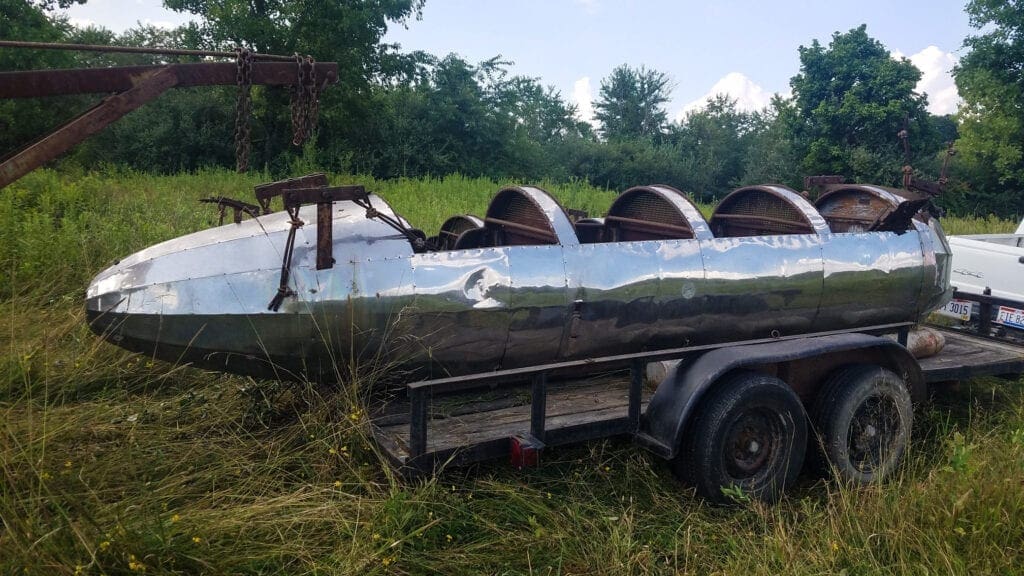
Bought at Auction
It was a little more than two years ago when Bates placed the Rocko Plane on a stretch of cleared land that actually was supposed to be part of a 400-acre lake that bordered Bates’ property.
His son, Brandon, asked him one day how he could get one of them for nostalgia’s sake and because the land on which the Rocko Planes were stashed was soon to be auctioned off. A phone call was made to the owner of the property, and Bates struck a deal, too. All he and his son had to do was pull the Rocko Planes from the woods and Brandon would get his souvenir.
“After that, my daughter and her husband went to the auction, and my son-in-law bought the other two, and he gave me one. At first, I was just going to put it in the woods like it had always been, but then I thought I’d put it down on my property along the interstate so people could see it and get a kick out of it,” Bates explained. “It wasn’t long until someone called me and told me that someone reported a rocket ship had crashed and that it was going crazy on the Internet. I got a good laugh from that.
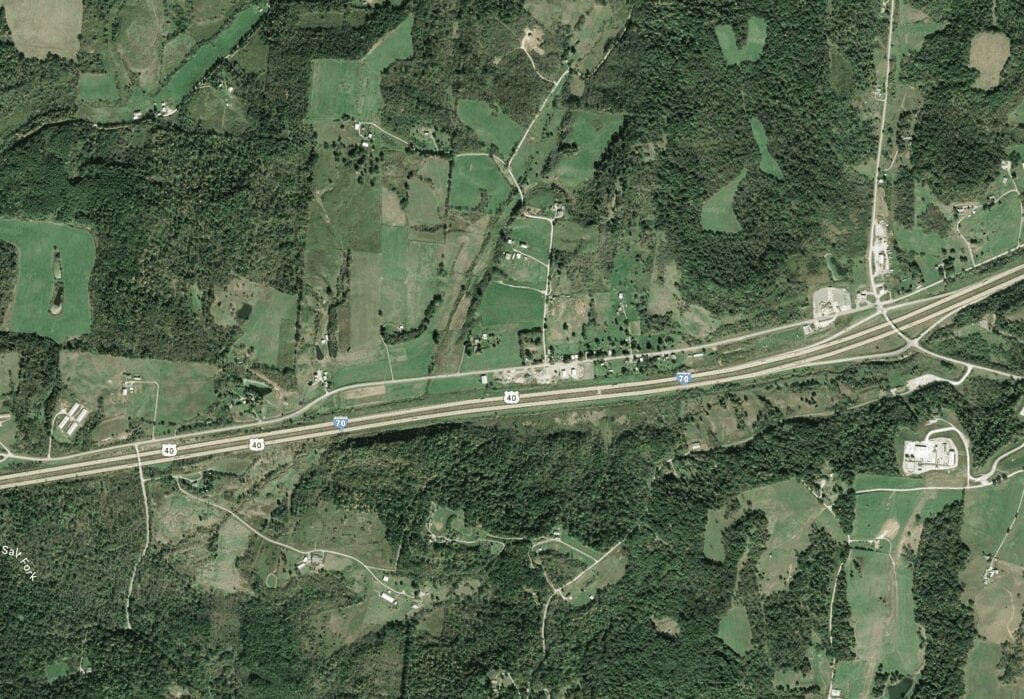
“I’m told pretty often that people snap photos of it and put it up on Facebook, and I guess those threads go for a while. At least that’s what the wife tells me,” he said. “I’ve even seen people stop and take pictures of it, and I have been told people have wanted to buy it, but it’s not for sale. We took a photo of us in it before we pulled it out of those woods, and most of our family has driven to where I put it so they could do the same thing.”
There were paddle boats in a lagoon near Frontier Paradise, but everyone who visits the scarred property notices a few things: after years of decay, much of what once remained of Paradise Lake has been removed, and some of the land has been developed for harvesting natural gas; a former Dairy Queen was transformed into the Lion’s Den Adult Store; and there’s no actual Paradise Lake to be found.
“There was a 400-acre lake that was part of Fry’s plan, and I was looking forward to it because I would have had shore rights because of where my property line was at that time,” Bates said. “They were going to dam up Salt Fork Creek to make a really big lake, and I wanted to build a pier. Out of everything Phil Fry said he was going to do, I sure wish he had built that lake because I could still be using it today.”
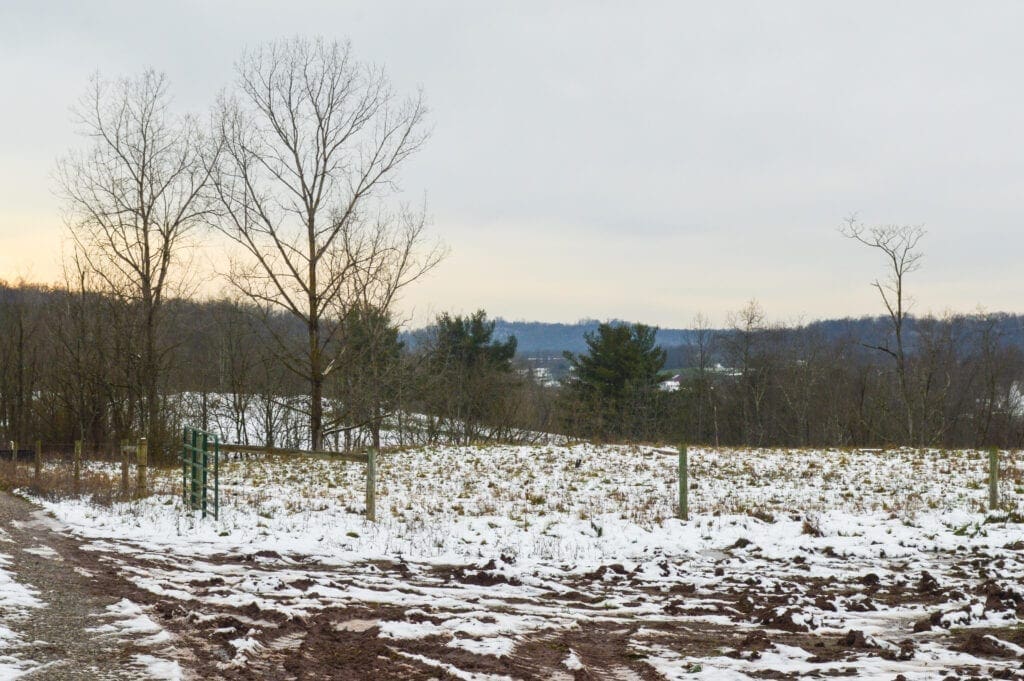
Hook, Line, and Sinker
Even as a man in his early 30s and working for the Ohio Bell Telephone Co., Bates was suspicious of Phil Fry soon after the development of the amusement park began and especially after Paradise Lake opened in July 1981.
The malfunctioning rides, employee trespassing, broken promises, and the “too-good-to-be” factor were just a few of the red flags noticed by nearby property owners, but, according to Bates, the local folks were told repeatedly by elected officials to be more tolerant because the park would benefit the county in the long run.
“I started questioning everything Phil Fry was involved with because I didn’t appreciate how the man went about things,” Bates said. “They did have some rides and a pond with paddle boats and some other things like a monorail, but some of the employees told us that they had to race to the bank to cash their paychecks before the money ran out in the account.
“On one payday, a friend of mine told tme hat he was one of only four people who were able to get their money before the teller started having to tell the other employees that there were insufficient funds in the account,” he continued. “And I know the health inspector went there a week before it opened and told Fry that he had to get permits for his water and for the eating establishments, and he told Fry that if he didn’t get the permits, he would go back and padlock everything. Well, that’s exactly what happened.”
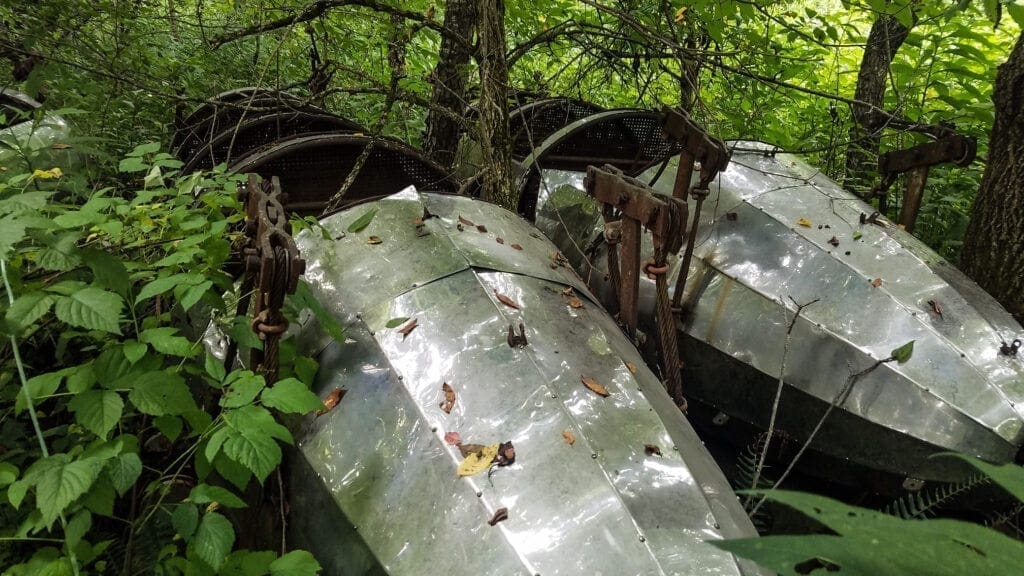
When the Door Slams Shut
Bates’ mistrust proved worthy, too, when the United Press International published the following report on Aug. 16, 1986:
The author of the book, ‘Pay No Income Taxes Without Going to Jail,’ was sentenced Friday to five years in prison for conspiring to defraud the federal government.
Phillip Fry, 42, former owner of the Tax Information Center, a tax and financial investment service, was sentenced by U.S. District Judge Joseph P. Kinneary.
The charge resulted from a two-year investigation by the Internal Revenue Service.
Fry and Barbara J. Schaer, 53, pleaded guilty June 30 to the charge. Schaer managed the Tax Information Center’s tax preparation office in Butler, Pa., and helped market fraudulent deductions, the IRS said.
Kinneary sentenced Schaer to three years in jail but suspended 2 years of the sentence and placed her on probation for that period. As part of a plea bargain, 16 other charges against Fry were dropped.
Fry also owned Freedom Fuel Corp., which was used to create tax deductions for Fry’s tax clients through promotion and sale of worldwide franchises to distribute gasohol.
Fry also wrote, ‘Our Lady of Perpetual Deductions,’ a book advising people how to establish churches to avoid taxes.
The IRS estimates the fraudulent tax shelters of Fry and Schaer, both of Mesa, Ariz., cost the government about $13 million in false deductions on about 300 tax returns filed throughout the country. The IRS also accused Fry of bilking his clients out of several hundred thousand dollars in fees and investment payments.
Fry was also known in Ohio and Texas for his amusement park operations in the early 1980s. He ran Paradise Lake in Cambridge, Ohio, and Prairie Dell Lake in Prairie Dell, Texas, until he filed for bankruptcy.
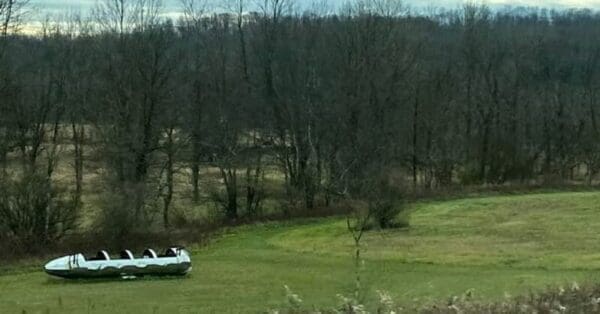
“The fact that the federal government sent him to prison didn’t surprise me a bit because he flaunted the fact that he didn’t pay income taxes,” Bates said. “He had some church called ‘Our Lady of Perpetual Deductions,” and he also wrote a book about how to get away with not paying taxes. That didn’t work out for him too well.
“I did meet him once when I was at the park, and I approached him and told him about the issue of people parking in my yard,” he remembered. “He had a young lady with him, and he told her to write it down so he remembered to take care that. Janice was behind the secretary, and she told me that the lady just scribbled on the paper and didn’t actually write anything down. And yeah, the cars kept parking in my yard, so that told me everything I needed to know.”
These days, though, Bates also finds funny the fact he and his family get the last laugh from the failed amusement park every time someone mentions his prized Rocko Plane.
“It may have been 40 years ago, but everyone around here knows the story and still talks about it from time to time,” he said. “Now, the people driving through on the interstate? Most likely, those folks don’t know the story of Paradise Lake, and I guess some people have thought it was a UFO or something paranormal.
“But hey, if it gives those folks something to talk about while they’re driving through, well, then good,” Bates concluded. “There’s not much else to see around here anyway, and we get a kick out of it when the Rocko Plane fires it up again.”


